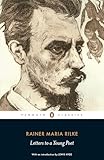Letters to a young poet: the letters from the young worker
Material type: TextSeries: Penguin classicsPublication details: London: Penguin Books, 2011.Description: xxviii, 84p., 20 cm X 13 cmISBN:
TextSeries: Penguin classicsPublication details: London: Penguin Books, 2011.Description: xxviii, 84p., 20 cm X 13 cmISBN: - 9780141192321
- 831.912
| Item type | Current library | Call number | Status | Date due | Barcode | |
|---|---|---|---|---|---|---|
| Books | KEIC | 831.912 RIL (Browse shelf(Opens below)) | Checked out | 08/28/2025 | 23886 |
Recommended by: Suraja Kishore
Summary: At the start of the twentieth century, Rainer Maria Rilke wrote a series of letters to a young officer cadet, advising him on writing, love, sex, suffering and the nature of advice itself; these profound and lyrical letters have since become hugely influential for writers and artists of all kinds. This book also contains the 'Letter from a Young Worker', a striking polemic against Christianity written in letter-form, near the end of Rilke's life. In Lewis Hyde's introduction, he explores the context in which these letters were written and how the author embraced his isolation as a creative force. Charlie Louth's afterword discusses the similarities and contrasts of the two works, and Rilke's religious and sexual wordplay. This edition also contains a chronology, notes, and suggested further reading.
There are no comments on this title.

